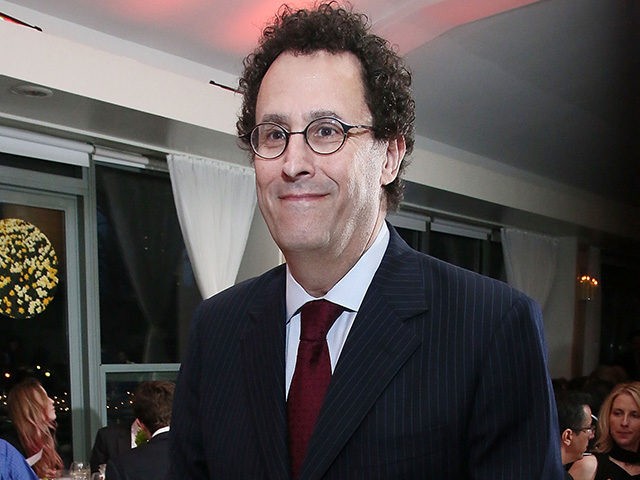Pulitzer Prize-winning playwright Tony Kushner defended the onstage assassination of a Donald Trump-like Julius Caesar in the Public Theater’s contemporary iteration of the play, telling the New York Times in an interview that the Shakespeare classic is supposed to be “upsetting.”
The Oskar Eustis-directed Shakespeare in the Park production of Julius Caesar — a modern take on the play in which the main character is dressed to look like the president, and which includes references to tweeting — opened Monday night to a standing ovation from an enthusiastic audience, according to Variety.
But the play has generated controversy over the Caesar character’s close resemblance to Trump. Some critics have said that the mock assassination of the Trump stand-in — in a graphic scene filmed and published by Inside Edition last week — crossed the line, particularly after another “artwork” depicting Trump’s death, a “beheading” photograph featuring comedian Kathy Griffin, stirred outrage last month.
In response to the controversy, Public Theater sponsors Bank of America and Delta Air Lines pulled their support, while American Express clarified that its funding did not go directly toward Shakespeare in the Park and that it did not “condone” the theater’s interpretation of Julius Caesar.
Ironically, the companies’ withdrawal of support set off another round of outrage, this time from some celebrities and theater figures, including from Kushner, the Pulitzer-winning Angels in America playwright.
“It’s an upsetting play, but if there’s a production of Julius Caesar that doesn’t upset you, you’re sitting through a very bad production,” Kushner told the New York Times. “It’s clear that the corporate sponsors who pulled out are just being cowardly and caving in to a lot of cranky right-wing people because Breitbart and Fox News told them to.”
Kushner wasn’t the only person to blame Breitbart and other conservative media for the sponsors’ withdrawal; in their article for the New York Times about the timeline of the controversy, writers Michael Paulson and Sopan Deb accused Breitbart of having “driven a campaign on social media against the Public [Theater]” that prompted the sponsors to make their decision.
Of course, Breitbart News had simply reported on the controversy, and never led a “campaign on social media” against the play. Early stories about the play centered on one theatergoers’s reaction to the graphic assassination scene, while stories about the corporate sponsors pulling out simply reported on the statements that each had made.
Perhaps unsurprisingly, the Times failed to accurately report on what appeared to be the real reason for the backlash over the play; that the level of vitriol against Trump has reached a heightened new level in recent weeks, and that it has now become acceptable to make jokes or art about the assassination of President Trump, and to be celebrated for doing so by theater critics, celebrities and the media.

COMMENTS
Please let us know if you're having issues with commenting.